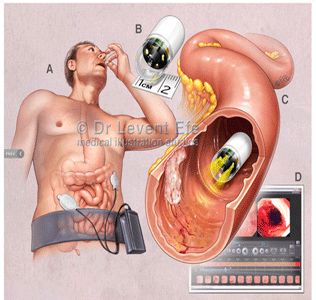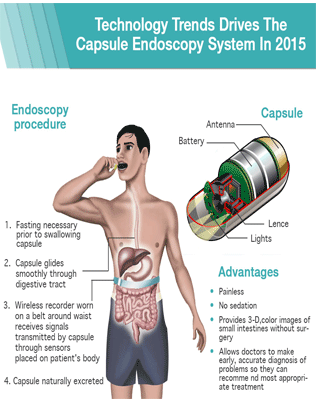Overview
Capsule endoscopy camera
Capsule endoscopy is a procedure that uses a tiny wireless camera to take pictures of your
digestive tract. A capsule endoscopy camera sits inside a vitamin-size capsule you swallow.
As the capsule travels through your digestive tract, the camera takes thousands of pictures
that are transmitted to a recorder you wear on a belt around your waist.
Capsule endoscopy helps doctors see inside your small intestine — an area that isn't easily
reached with more-traditional endoscopy procedures. Traditional endoscopy involves passing
a long, flexible tube equipped with a video camera down your throat or through your rectum.
Capsule endoscopy has also been approved for the screening of the colon for colon polyps for
those for whom a colonoscopy couldn't be completed. But how and on whom it will be used
is still being determined because better alternatives are available. As technology improves,
capsule endoscopy of the colon may be used more in the future.
Capsule endoscopy has also been approved to evaluate the muscular tube that connects your
mouth and your stomach (esophagus) to look for abnormal, enlarged veins (varices). It's
rarely used because experience with it is limited and traditional upper endoscopy is widely
available.
Why it's done
Small intestine
Your doctor might recommend a capsule endoscopy procedure to:
- Find the cause of gastrointestinal bleeding. If you have unexplained bleeding in
your digestive tract, capsule endoscopy can help find the cause.
- Diagnose inflammatory bowel diseases, such as Crohn's disease. Capsule
endoscopy can reveal areas of inflammation in the small intestine.
- Diagnose cancer.Capsule endoscopy can show tumors in the small intestine or other
parts of the digestive tract.
- Diagnose celiac disease. Capsule endoscopy is sometimes used in diagnosing and
monitoring this immune reaction to eating gluten.
- Screen for polyps. People who have inherited syndromes that can cause polyps in the
small intestine might occasionally undergo capsule endoscopy.
- Do follow-up testing after X-rays or other imaging tests. If results of an imaging
test are unclear or inconclusive, your doctor might recommend a capsule endoscopy
to get more information.



